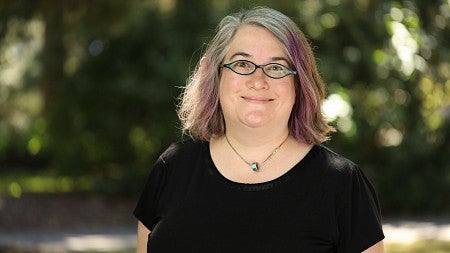
UO Libraries
Courses: Library sessions in WR320, WR123, FIGs and others.
In my courses you will:
- Practice foundational, transferrable skills.
- Interact during exciting, participatory class meetings.
I was invited into the Teaching Academy because:
- I participated in the Summer Institute on Scientific Teaching.
In what ways are you working to make your teaching inclusive?
Since I visit and guest teach others’ courses, I have to work within the boundaries of one or two sessions of a course. One small concrete thing I’ve done is to adapt an in-class activity to better accommodate those who need more time to read. The original activity involved handing students some excerpts of articles to read in class and then use for the rest of the activity. I noticed that some students were slower readers and then became rushed to complete the activity. Providing the reading ahead of time so the material could be read and digested allowed for all students to come to the in-class activity ready to participate
What do you do in terms of professional engagement with the teaching and learning culture on campus or nationally?
While I’ve learned from attending library teaching conferences like LOEX and Library Instruction West, reading books like Small Teaching by James Lang, and reading articles, the most helpful thing I’ve done since arriving at UO to get better at teaching is to observe other people teaching. I’ve observed other librarians teach through a structured program called Teaching Squares, and have observed both other librarians and other faculty teaching more informally. Every time I observe a class I pick up tips.
In what ways was your teaching in this course research-led—informed by research on how students learn and inflected by UO's research mission?
When planning an instruction session, I try to use Backward Design to start with what the students should have accomplished by the end of the session and create activities to get them there. I’ve used the Teaching Practices Inventory (and a modified version aimed at librarians) to reflect on whether I’m really using the evidence-based practices that I aim to.
Why did you become a librarian?
I became a librarian as a second career after working first as a software engineer and realizing that I needed more interaction with people than programming provided. One of the best things about librarianship is how broad it is. I have colleagues who deal mostly with research data, others with digital humanities projects, and still others with the manuscripts in Special Collections and University Archives (SCUA). In my position I get to work with students and faculty in the Computer and Information Science, Mathematics, and Physics departments to help them find resources, refine their research questions, figure out where to publish their research, make sure we have the books they need, and otherwise save them time.
What is your favorite podcast?
I’m a podcast junkie so picking only one is hard. Today I’ll say 99% Invisible, a show ostensibly about design. They do such a good job of telling a larger story about humanity by talking about something small in our built world.
